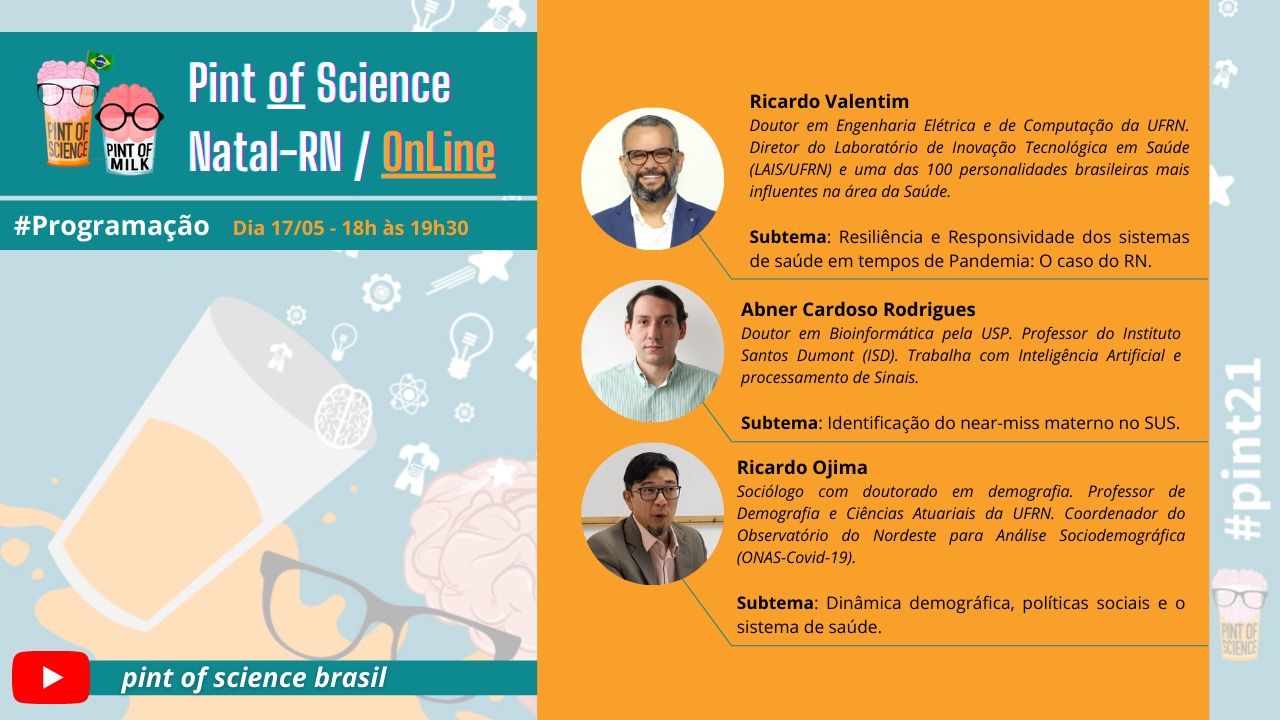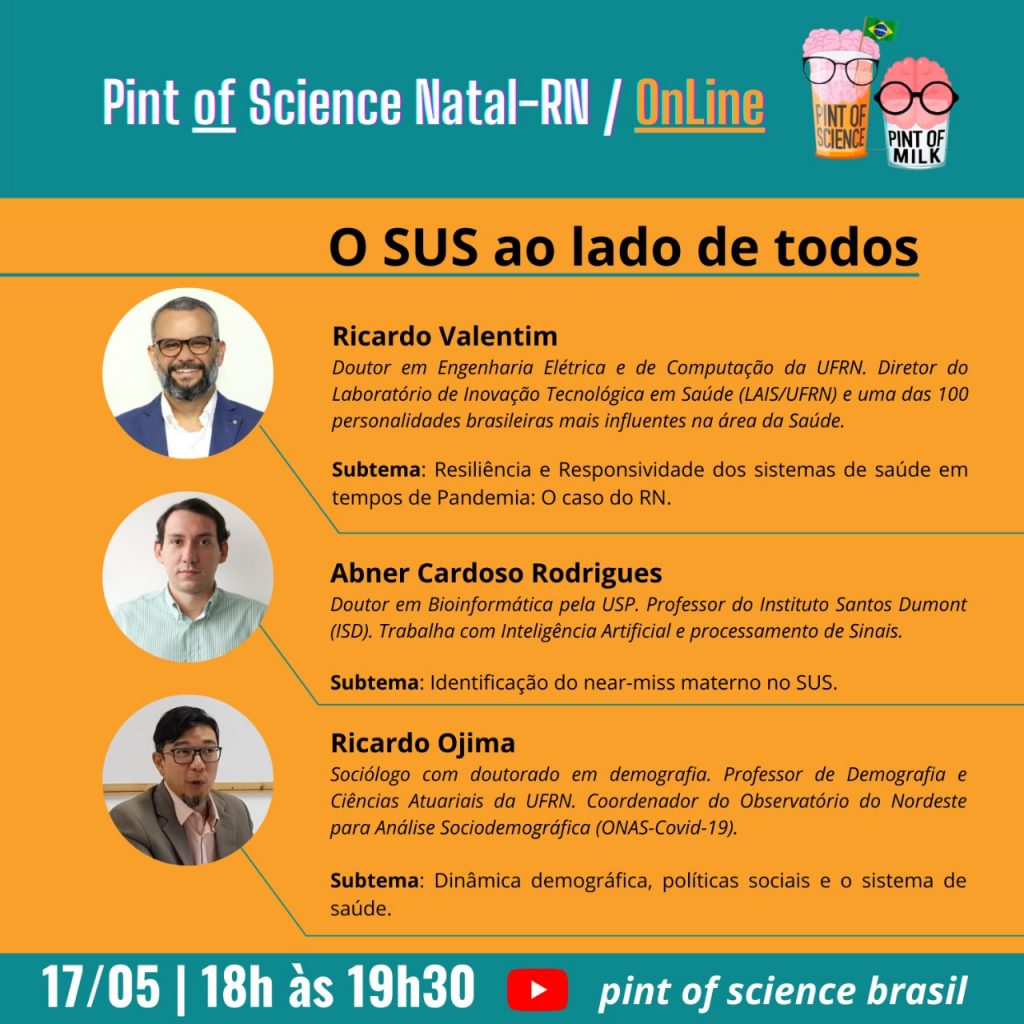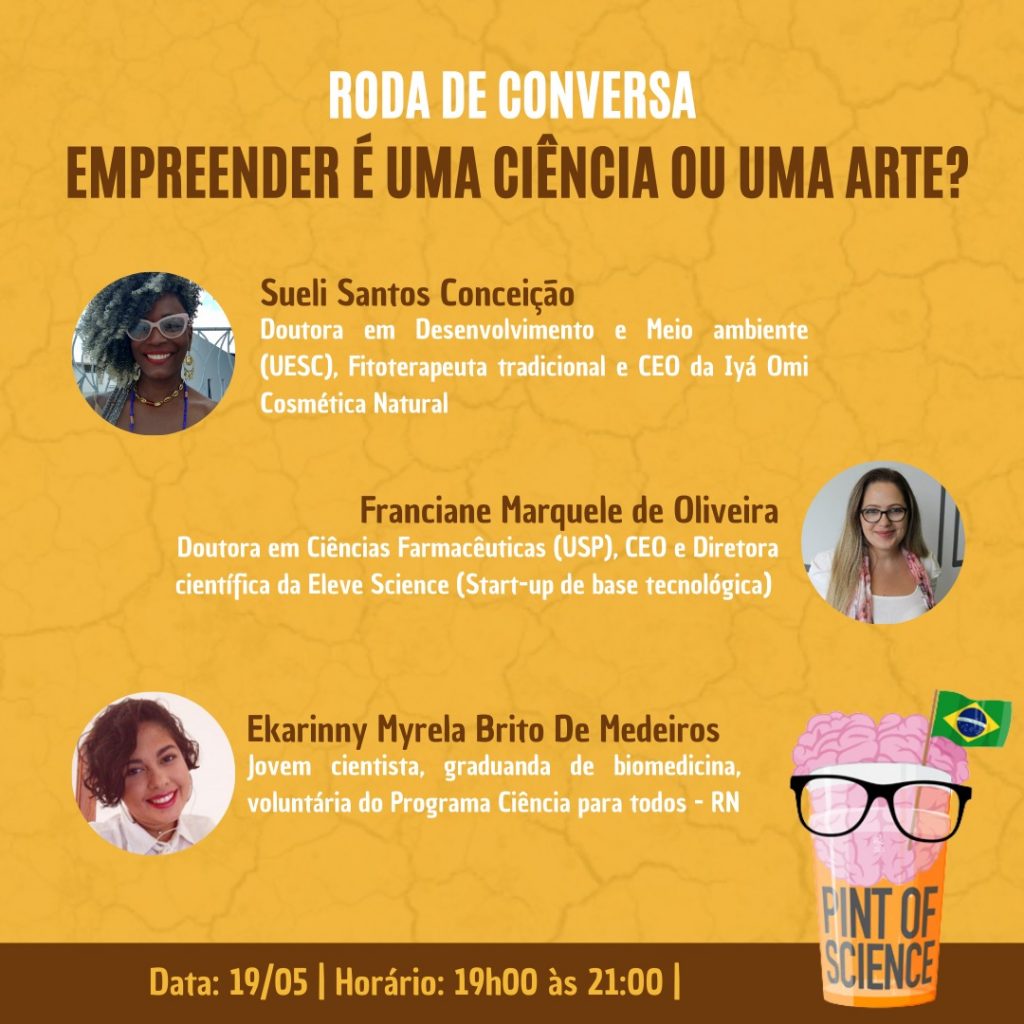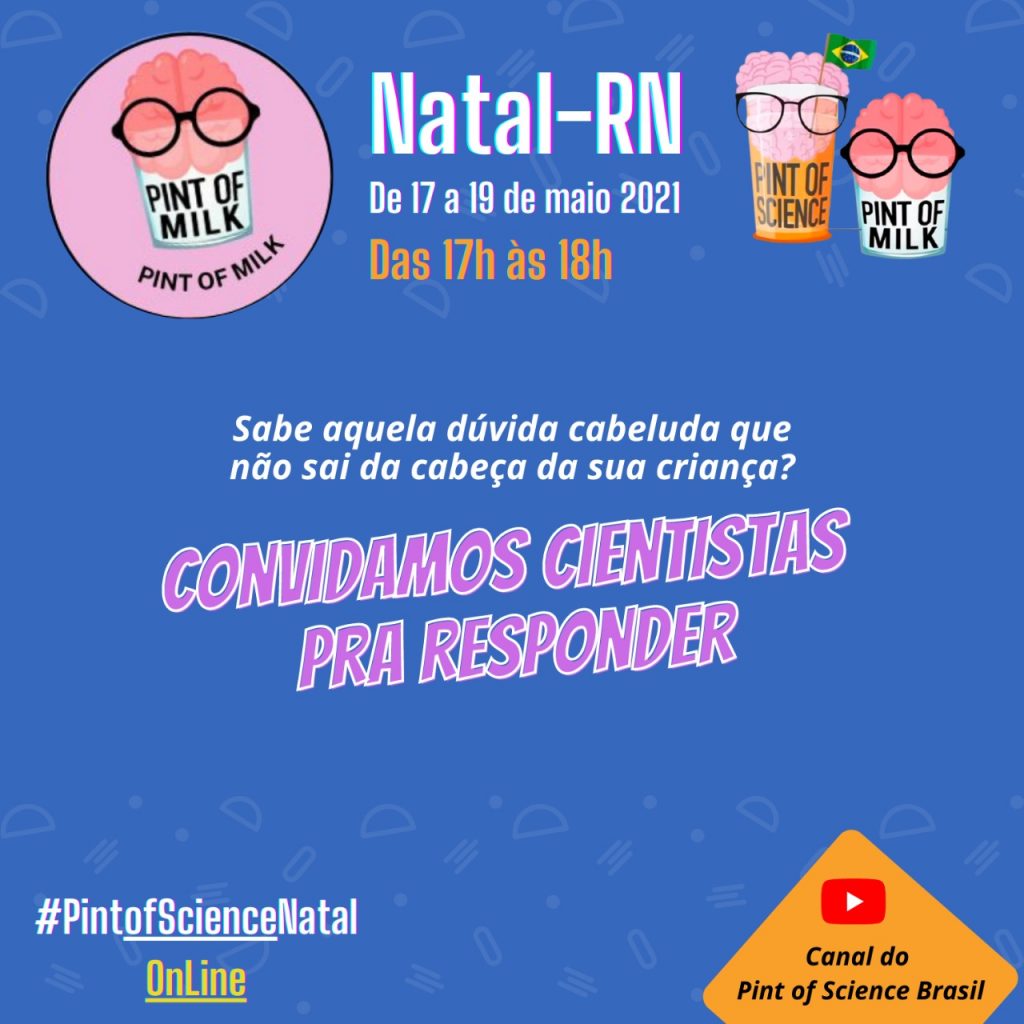“What is a neuron?”, “How does the brain project dreams?”, “Is it cool to be a scientist?”, “How does a tumor appear?”, “How does our brain work?”, “why is the sky blue? ”, “Why doesn’t the moon fall?”, “Will the coronavirus end this year?”. “How long are we going to wear masks?”.
How many questions fit in a child's head? A selection extracted from a list of more than 400 that intrigue students from the 2nd to the 9th year of public and private schools in the capital and the Metropolitan Region will be answered with the help of students and researchers from the Santos Dumont Institute (ISD) and other educational institutions and state research, in the first edition of Pint of Milk in Natal, a new feature of the Pint of Science 2021 program, which will be held virtually on May 17th, 18th and 19th. The broadcasts will be carried out on the channel Pint of Science Online – Brazil on Youtube.
In addition to embarking on children's curiosity, ISD participates in a debate on the first day of the event with the theme “The SUS on everyone's side”, in which the Institute's professor-researcher, Abner Rodrigues, will talk about the project he coordinates to identification of the maternal “near-miss” in the SUS, in partnership with Reginaldo Freitas Júnior, professor-researcher and general director of ISD.
The project’s proposal is to use artificial intelligence to correctly identify and predict cases of women who almost die during pregnancy, childbirth or postpartum due to serious complications due to bleeding, hypertension or infection, for example – called “near miss” . The debate will start at 6 pm and will include the participation of the director of Laboratory of Technological Innovation in Health (LAIS/UFRN), Ricardo Valentim, and Professor of the Department of Demography and Actuarial Sciences (DCAA/UFRN), Ricardo Ojima. They will address topics such as the health system in times of a pandemic and social public policies.
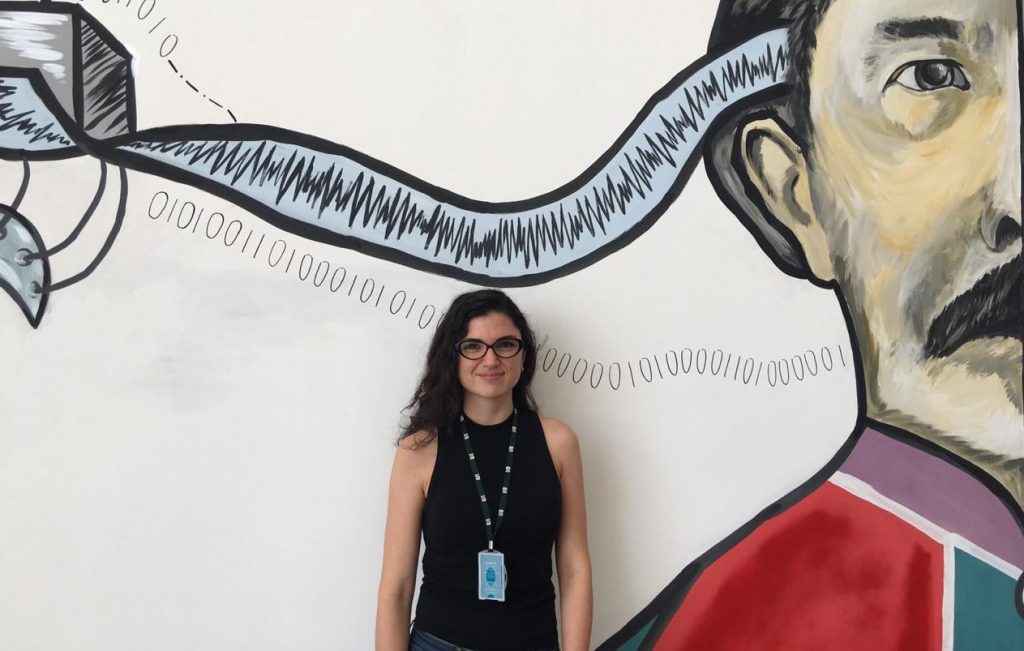
The Pint of Science
At Pint of Science Natal, professors, researchers and students from Instituto Santos Dumont (ISD), Federal University of Rio Grande do Norte (UFRN), and brain institute (ICe) prepare a special and diversified program for both adults and children.
The result is a well-seasoned menu with doses of neuroscience, technologies applied in public health, entrepreneurship, female protagonism, science and the pandemic, in addition to the novelty that will answer the main questions of the little ones about the scientific world.
Science has become an excellent appetizer in many Brazilian bars since 2015, thanks to the Pint of Science international science festival. In 2021, the edition will be held virtually for the second time because of the pandemic. Instead of the traditional bar table, the public will be able to savor science on YouTube in live debates.
“The idea is to promote scientific dissemination and debates around the world. This program does not only happen at Christmas. Each city has promoted initiatives aimed at the event, talking about science,” says professor-researcher at the Santos Dumont Institute and one of the organizers of the Pint of Science Natal, Maria Carolina Gonzalez. “Before, in bars, the objective was to have relaxed moments and break down the barriers between science and society a little, now we try to bring this idea even if in a virtual way”, he adds.
Zoom in on the images below to see the full schedule:
maternal near-miss
It is up to Abner Cardoso (ISD) to present one of the projects he develops at the Institute, approved in 2020 in the public notice “Data science to improve maternal and child health, women’s health and children’s health in Brazil” – launched by the Bill & Melinda Foundation Gates together with the National Council for Scientific and Technological Development (CNPq) and the Department of Science and Technology of the Secretariat for Science, Technology and Strategic Inputs of the Ministry of Health. The project will last for 18 months, starting this year, and intends to create an indicator in Brazil that can help prevent cases of “near death” and deaths during pregnancy, childbirth and postpartum.
The work will be developed with the participation of students from the master's program in Neuroengineering at the Instituto International Neurosciences Edmond and Lily Safra of the ISD (IIN-ELS/ISD).
“The idea (during the event) is to speak about 20 minutes about the project. I will address the general problem of near miss, the importance and justification, the state of this problem in Brazil, the data available from the SUS systems, how this data is used and what are the next challenges for the project”, says the professor-researcher of the ISD.
The project, according to him, is in the phase of understanding the available databases and reviewing the literature. “I believe that after this phase of understanding the problem and the data, we are going to start thinking about the implementation of automatic near miss identification methods”, details Cardoso.
The work is closely monitored by the Ministry of Health. The professor explains that one of the objectives is to provide an accessible tool to help guide the actions of people who make public health policy decisions.
“In the case of near miss, this number is rarely used in Brazil, but it is already known that it is an important indicator of the quality of primary care. So, when the project succeeds in classifying the near miss correctly and making these numbers available, I believe it can become an important contribution to the SUS”, he observes.
Play the video below to follow the debate on the 17th.
pint of milk
Because the sky is blue? Is there life on Mars? What is a neuron? One of the novelties of this year's Pint of Science will answer questions selected from a list that, on the morning of Friday (14th) already exceeded 400 questions.
Pint of Milk, aimed at elementary school students, aims to clear the minds of children and solve the most intriguing doubts of the little ones. Questions created by young students on various science topics will be answered by researchers and graduate students. The activity will be broadcast on all three days during the first half hour of the event.
About 10 students of the Master's Degree in Neuroengineering at the Santos Dumont Institute are involved both in the organization and in the elaboration of the response videos that will be made available on Pint of Science's Youtube on May 19th.
“We searched elementary schools and asked students to say what their biggest questions are, the ones they think only science can answer. The list is huge and there are other questions like 'why does the sun shine so much?' and 'because the moon doesn't fall', this is an interesting window to feed children's interest in science”, explains Carolina Gonzalez.
Play the video below to see Pint of Milk on May 19th.
Schedule
The online event schedule also includes moments with the debate “Misuse of drugs: side effects of the pandemic, on May 18 at 7 pm. The purpose of the conversation is to raise questions about the side effects of the prophylaxis offered by medicine against Covid-19 and the doctor of surgery at the State University of Campinas (Unicamp), Ilka de Fátima Santana Ferreira Boin and the doctor of biology and professor at the Federal University of Paraíba (UFPB), Bagnólia Araújo Costa.
The last day of the event brings together the Northeast region under the theme “Is Entrepreneurship a Science or an Art?” This day will be marked by the speech of three women entrepreneurs: Sueli Santos Conceição, traditional herbalist and CEO of Iyá Omi Cosmética Natural; Ekarinny Myrela Brito De Medeiros, young scientist, graduate student in Biomedicine and volunteer at the Science for All Program – RN; and Franciane Marquele de Oliveira, CEO and Scientific Director of Eleve Science, a technology-based start-up.
Streaming
The activities will be broadcast from the 17th to the 19th of May always at 7 pm live on the YouTube channel of Pint of Science. Access the links below and activate reminders for each schedule.
Day 17: “The sus next to everyone”
Day 18: "Misuse of drugs: side effects of the pandemic
19th day: Is entrepreneurship a science or an art?
19th day: Pint of Milk
Text: Kamila Tuenia – Journalism Intern / Ascom – ISD
Edition: Renata Moura – Journalist / Ascom – ISD
Photos: Disclosure Pint of Science
Communication Office
comunicacao@isd.org.br
(84) 99416-1880
Santos Dumont Institute (ISD)
It is a Social Organization linked to the Ministry of Education (MEC) and includes the Edmond and Lily Safra International Institute of Neurosciences and the Anita Garibaldi Health Education and Research Center, both in Macaíba. ISD's mission is to promote education for life, forming citizens through integrated teaching, research and extension actions, in addition to contributing to a fairer and more humane transformation of Brazilian social reality.



